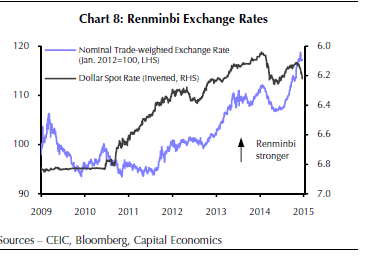China quietly joins Asia's currency wars to avert deflation
(中国、デフレ回避でこっそりアジア通貨戦争に参戦)
By Ambrose Evans-Pritchard, International Business Editor
Telegraph: 7:12PM GMT 22 Dec 2014


(中国、デフレ回避でこっそりアジア通貨戦争に参戦)
By Ambrose Evans-Pritchard, International Business Editor
Telegraph: 7:12PM GMT 22 Dec 2014
China is exposed like a sore thumb as countries devalue on all sides, from Russia, to Japan, Indonesia and Malaysia
ロシアから日本、インドネシア、マレーシアまでそこら中で各国が為替操作にいそしむ中、中国が取り残されています。
China has for the first time warned openly about the excessive strength of the Chinese yuan, a sign that the country may be shifting its exchange rate policy as deflation takes hold and currencies slide across Asia.
中国が人民元の過剰な高さについて初めてあからさまなワーニングを出しました。
デフレが本格化してアジア全域で通貨下落が起こる中で、為替政策をシフトするかもしれないぞ、という兆しです。
Yi Gang, the deputy governor of the People's Bank of China (PBOC), said the yuan's rise had been "very fast" over the past year as it surges in tandem with the US dollar, making it the world's second strongest currency.
中国人民銀行のYi Gang副総裁は、人民元は米ドルと共に急上昇しているので、この一年間の上昇スピードは「非常に速く」なって、世界第2位の強い通貨となっているとしました。
China's real effective exchange rate (REER) has risen for six months in a row, tightening the screws on struggling exporters with wafer-thin margins. It rose 2.3pc in trade-weighted terms in November alone as countries devalue on all sides, leaving China exposed like a sore thumb. The effect is to tighten China's monetary conditions into the downturn.
中国の実質為替レートは6ヶ月連続で上昇し、微々たる利幅で悪戦苦闘する輸出業者を益々締め上げつつあります。
そこら中で各国が為替操作にいそしむおかげで、実効為替レートは11月だけで2.3%も上昇し、中国は取り残されました。
中国の金融状態が不況へ向けて引き締められるという影響が出ています。
The country has quietly joined Asia's escalating currency wars, steering the yuan down by 2pc against the dollar since early November. This looks increasingly like a move to protect itself against Japan's dramatic devaluation and against weakening currencies in Korea and other key Asian states.
同国はアジアで加熱する通貨戦争に密かに参戦しており、11月上旬以降、人民元を米ドルに対して2%下落させました。
これは日本の劇的デバリュエーションや下落し続ける韓国やアジア主要国の通貨に対する防衛の様相を強めています。
The yuan is no longer fixed to the dollar but remains linked through a "soft peg". It has therefore been forced sharply upwards this year even though the Chinese economy is slowing and the country is losing global competiveness.
人民元はもう米ドルに固定されてはいませんが、それでも「ソフト・ペッグ」でつながったままです。
従って、今年は中国経済が減速して国際競争力を失っているにも拘わらず、人民元が急上昇させられているのです。
China is also sliding uncomfortably close to deflation. Producer prices are falling at a rate of 2.7pc as excess plant in steel, cement, chemicals, coal and even solar chips lead to price wars. The headline inflation rate has dropped to 1.4pc. "China has a major deflation problem," said Societe Generale.
また、中国はかなりデフレに近付いています。
鉄鋼、セメント、化学、石炭、そしてソーラーチップですら余剰生産性を抱えて価格競争が起こっているため、生産者価格は2.7%のペースで下落しています。
消費者物価指数は1.4%まで下落しました。
「中国には大きなデフレ問題があるよ」とソシエテ・ジェネラルは言っています。
Any action to devalue the yuan has the effect of exporting China's deflation to the rest of the world, especially to Europe where the authorities are struggling to defend themselves.
人民元安を狙った対策は全て中国のデフレを世界中に輸出する効果があります。
特に、当局が防衛に悪戦苦闘しているヨーロッパです。
The chief currency shock comes from Japan, where the world's most radical monetary experiment has caused the yen to plunge by 40pc since early 2012. This yen slide has become increasingly threatening over recent months as the Japan's exporters start to cut prices rather than pocketing the exchange rate gains as higher profit.
主な通貨ショックの出所は、世界で最も異次元的な金融実験で2012年初頭比-40%という円安を実現した日本です。
この円安は、日本の輸出業者が為替変動による棚ボタ利益を得るのではなく価格を引き下げ始めたおかげで、益々脅威となっています。
Emerging market jitters have led to a further currency sell-off in a string of countries, from Russia to Indonesia, India, Thailand and Malaysia. The effect is to leave China stranded in a sea of devaluation. "This is similar to the East Asia crisis in 1998 when the Japanese yen was falling like a stone," said George Magnus, from UBS. "Given the mix of slowing growth and deflation in China, I don't see how they can hold the line."
新興市場の混乱によって、ロシアからインドネシア、インド、タイ、マレーシアまで、様々な国でも通貨が更に下落しました。
それによって中国はデバリュエーションの海で立ち往生することになりました。
「これは日本円がストーンと下落した1998年の東アジア金融危機に似てるよね」とUBSのジョージ・マグナス氏は言います。
「中国の成長減速とデフレの組み合わせを考えたら、耐えられるとは思えないね」
Mr Yi said the recent fall in the Chinese yuan is the result of market forces as Beijing phases out rigid controls. However, there are signs that the country is once again buying foreign bonds to hold down the currency.
Yi副総裁曰く、最近の人民元安は、中国政府が厳格な規制を段階的に緩和している中でマーケットのフォースが引き起こしたものだそうです。
しかし、中国がまた人民元を抑え込むために外債を買っているという気配はあります。
China stopped intervening earlier this year after purchasing $106bn of US Treasuries, German Bunds, Gilts and other bonds, in the first quarter. Premier Li Keqiang said in May that the country's $4 trillion reserves had become burden and was making it harder to run an independent monetary policy, but he does not have the last say on the Standing Committee.
中国は第1四半期に米国債、ドイツ国債、英国債などを1,060億ドルも買い込んだ後、介入を止めました。
李克強首相は5月に、中国が保有する4兆ドルの外貨準備は負担になっていて、独自の金融政策を実施するのを益々困難にしていると言いましたが、常任委員会で最終的な決断を下せるわけではありません。
Marc Chandler, from Brown Brother Harriman, said the Chinese currency is falling under its own weight. "We don't think the government is intervening to drive it down. Capital is leaving the country," he said.
ブラウン・ブラザー・ハリマンのマーク・チャンドラー氏は、人民元は自重で潰されているんだと言います。
「政府が介入すると思わない。資本は中国から出てっているから」とのこと。





















